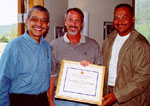Center nets national service recognition
MUSC's Family Services Research Center has received the Points of Light Foundation Presidentís Award. The award recognizes excellence in community service directed at solving community problems. Dr.
Scott Henggeler, center, director, Family Services Research Center and
professor, Department of Psychiatry and Behavioral Sciences, and Dr. Phillippe
Cunningham, right, associate professor, Department of Psychiatry and Behavioral
Sciences, receive the Points of Light Foundation Presidentís Award from
Robert Goodwin, president and chief executive officer, Point of Light Foundation.
The award recognizes excellence in community service directed at solving
community problems.
Dr.
Scott Henggeler, center, director, Family Services Research Center and
professor, Department of Psychiatry and Behavioral Sciences, and Dr. Phillippe
Cunningham, right, associate professor, Department of Psychiatry and Behavioral
Sciences, receive the Points of Light Foundation Presidentís Award from
Robert Goodwin, president and chief executive officer, Point of Light Foundation.
The award recognizes excellence in community service directed at solving
community problems.
The center's program, Multisystemic Therapy (MST), helps parents succeed with highly troubled youth. It is currently being used in more than 25 states in the United States, numerous sites in Canada, and several European countries.
The Family Services Research Center, under the direction of Scott Henggeler, Ph.D., has developed clinically and cost effective family- and community-based mental health and substance abuse services for youths with serious problems relating to substance abuse, serious emotional disturbances and violence.
The emphasis of MST is on providing a family- and community-based alternative for youths at imminent risk of out-of-home placement in facilities such as inpatient psychiatric units, juvenile detention centers and residential treatment centers.
The focus of support is on building the strengths of the families, friends, schools and communities surrounding these youths.
The program was also recently recognized as one of the 2001 honorees of Families Count, the Annie E. Casey Foundation national honors program recognizing organizations that are making a difference in the lifes of families struggling to survive in tough neighborhoods.
The intense four-month treatment regimen keeps youngster in school, through the involvement of family and community resources.
Under the program, a staff member trained in MST is on call for each child, 24 hours a day and also spends several hours a week with a family for four months. At the beginning, the family and the staff member identify the familyís strengths and weaknesses and set goals together.
During treatment, the staff members help the family learn how to communicate and manage conflicts. Parents also learn how to discipline and reward their children more effectively, become involved in their school performance, and develop a positive community support network.
There are about 400 therapists in the U.S., Norway and Canada who have received MST training and 5,000 children receive MST services each year.
A 1998 study by the Washington State Institute for Public Policy estimated that graduates of MST committed 44 percent fewer felonies than juvenile offenders who did not participate in the program. MST costs about $5,500 per client, while imprisonment or residential treatment costs about $30,000.
The cost savings go even further: Because far fewer MST clients commit
crimes after treatment, society saves an additional $40,000 for each youth
in the program, the study said.